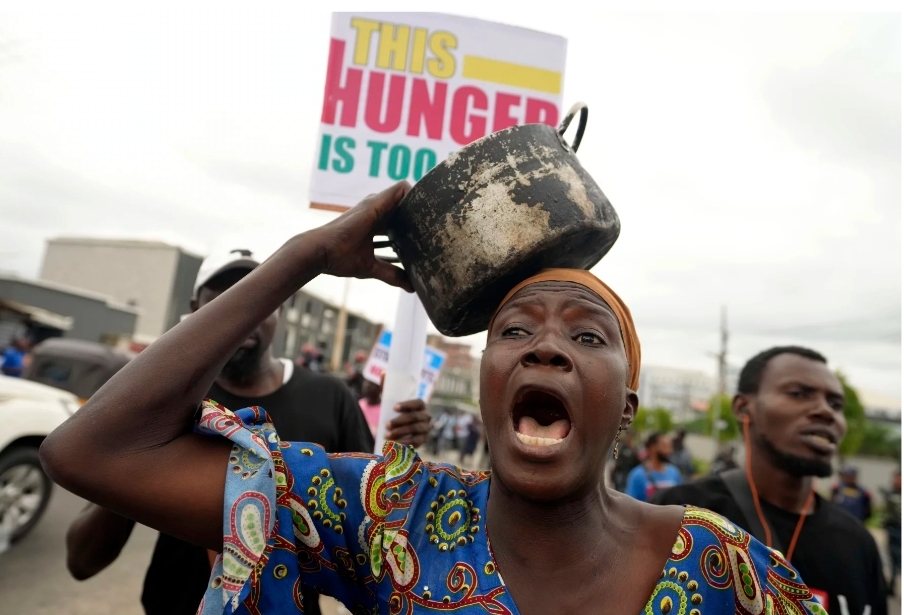The report said that multidimensional poverty is higher in the rural areas.
Olayomi Koiki

ABUJA, Nigeria – No fewer than 86 million Nigerians are living in multidimensional poverty, ActionAid Nigeria (AAN) said on Friday.
This was made known by the organisation on Friday in Abuja at the end of its ‘Austerity campaign launch with the theme; Public Discourse on Ending Poverty and Inequality in Nigeria’.
Speaking at the launch, Country Director of AAN, Mr Andrew Mamedu said the underlying cause of this poverty is rooted in the heavy burden of austerity measures, imposed as part of broader macroeconomic policies in the West African country.
The report said that multidimensional poverty is higher in the rural areas, where 72 percent of people are considered poor and also constitute approximately 70 percent of all Nigeria population who live in the rural areas compared to 72 percent of people in the urban areas.
Mamedu said that in communities across Nigeria, where austerity measures have led to the withdrawal of social services, it is women who step into the void, providing unpaid care work at the expense of their economic independence and well-being.
He said: “According to the austerity report, Nigeria has more than 64 percent or more representation of women in senior positions, but women earn only 50 percent of the income earned by men.
“The barriers to women’s advancement are deeply entrenched, from discriminatory laws and practices to limited access to resources and opportunities.
“Despite efforts to close the gender gap, the lack of investment in women’s economic empowerment has only widened the disparities.”
Earlier, the Minister of Budget and Economic Planning, Abubakar Atiku Bagudu, represented by the Director Macro Economy Analysis, Felix Okonkwo, said addressing poverty is essential, not only for economic growth, but also for preventing conflict, insecurity and mitigating the effects of climate change.
Nigeria is facing its worst economic crisis in decades, with skyrocketing inflation, a national currency in free-fall and millions of people struggling to buy food. Only two years ago Africa’s biggest economy, Nigeria is projected to drop to fourth place this year.
The pain is widespread. Unions strike to protest salaries of around $20 a month. People die in stampedes, desperate for free sacks of rice. Hospitals are overrun with women wracked by spasms from calcium deficiencies.
Although President Bola Tinubu increased the minimum wage — after strike action and months-long negotiations with labour unions — from ₦30,000 to ₦70,000, his government has increased spending for officials at a time of nationwide starvation.
For workers earning the new ₦70,000, or $43, per month minimum wage, capricious inflation and naira value have inflicted too much damage for the changes to make any difference in their lives.
The crisis is largely believed to be rooted in two major changes implemented by Mr Tinubu, elected 16 months ago: the partial removal of fuel subsidies and the floating of the currency, which together have caused major price rises.
A nation of entrepreneurs, Nigeria’s more than 200 million citizens are skilled at managing in tough circumstances, without the services states usually provide. They generate their own electricity and source their own water. They take up arms and defend their communities when the armed forces cannot. They negotiate with armed kidnappers when family members are abducted.
But right now, their resourcefulness is being stretched to the limit.
Prices of petrol tripled since the removal of subsidy in May 2023, from around ₦200/litre to about ₦1000/litre, compounding the woes of the citizens who power their vehicles, and generating sets with petrol, no thanks to decades-long epileptic electricity supply.
Amid a lingering fuel scarcity and crisis, petrol is being sold for ₦855 per litre at state-owned petroleum company, NNPCL, cementing claims that the price has been reviewed upward to reflect the nation’s current foreign exchange woes and fuel landing cost hassles.
In recent weeks, the nation has suffered an acute fuel scarcity that led the few stations with fuel to sell at exorbitant prices above ₦1,000 per litre while black market prices exceeded ₦1,200.
In August, Amnesty International accused Nigerian security forces of killing at least 21 protesters during a week of economic hardship protests.
Police and other security agencies clamped down on protests after thousands of people joined rallies against government policies and the high cost of living from August 1st to 10th.
Security forces denied responsibility for deaths during the protests.
